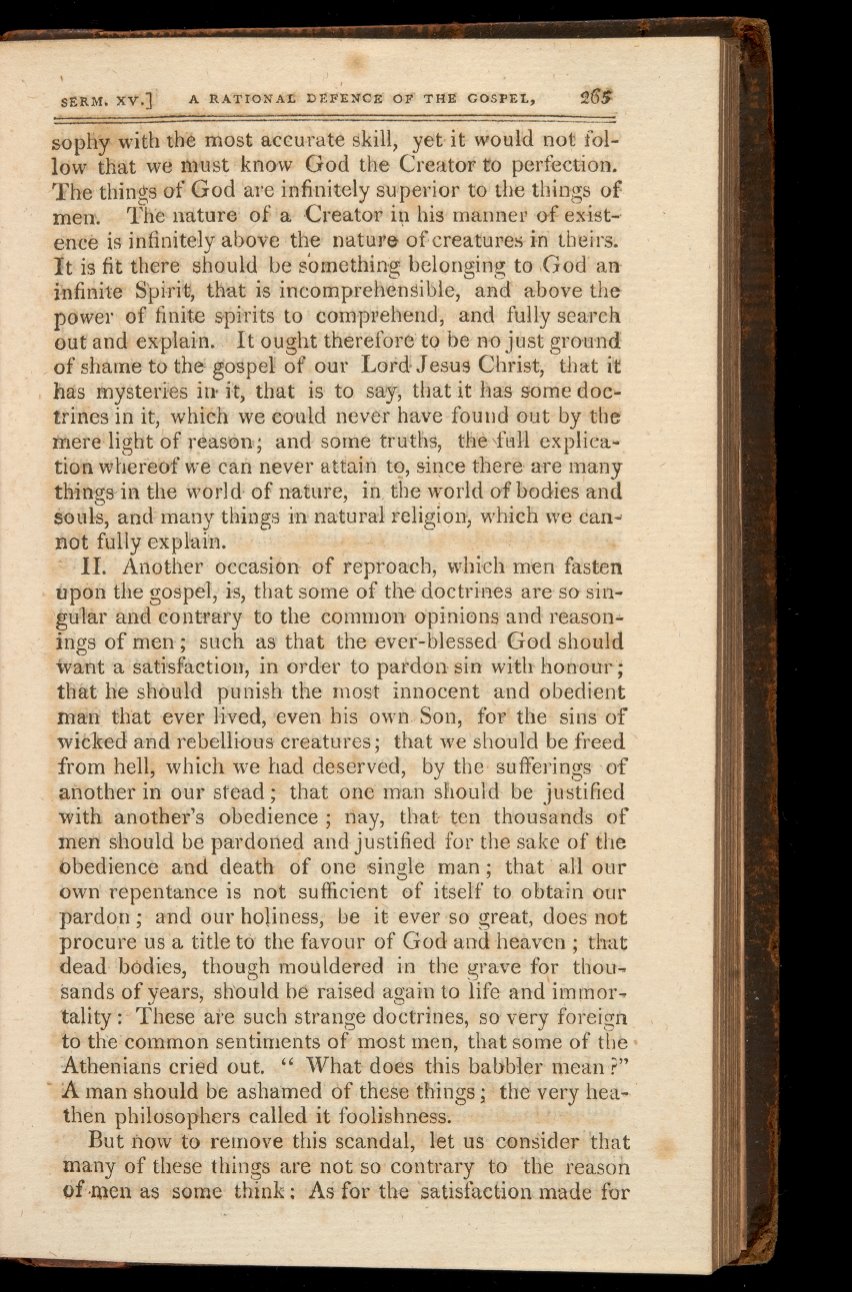

SEEM. XV.1
A
RATIONAL DEFENCE OF THE GOSPEL,
265
sophy
with the
most accurate
skill, yet,
it
would
not
fol-
low
that
we
must
know
God the Creator
to perfection.
The
things
of God are
infinitely
superior
to the
things
of
men. The
nature
of
a
Creator
hi
his
manner
of
exist
ence
is
infinitely
above the
nature
of
creatures
in
theirs.
It
is
fit
there should
be
something belonging
to
,God
an-
infinite Spirit,
that
is
incomprehensible,
and
above
the
power
of
finite
spirits
to
comprehend, and
fully
search
out
and explain.
It
ought
therefore
to be no
just
ground
of
shame to
the
gospel
of our
Lord Jesus
Christ,
that
it
has mysteries
in
it,
that
is
to
say,
that
it
has some doc-
trines
in it, which
we
could never
have
found
out
by
the
mere light
of
reason;
and
some
truths,
the
full
explica-
tion whereof
we
can never
attain
to,
since
there
are many
things
in the world
of
nature,
in
.
the world
of
bodies
and
souls,
and many
things in
natural
religion, which
we
can-
not
fully
explain.
II.
Another
occasion
of
reproach,
which men
fasten
upon the gospel,
is,
that
some
of the
doctrines are
so sin-
gular and
contrary
to the
common opinions
and reason-
ings
of
men;
such
as
that
the
ever
-
blessed
God
should
Want
a
satisfaction,
in
order
to
pardon
sin with
honour;
that
he
should punish the most
innocent
and
obedient
man
that
ever
lived,
'even his own. Son,
for the
sins
of
wicked
and
rebellious
creatures; that
we
should
be
freed
from
hell,
which
we
had deserved,
by
the
sufferings
of
another
in
our stead
;
that
one
man
should
be
justified
with
another's
obedience
;
nay,
that
ten
thousands
of
men should
be
pardoned
and justified for the
sake
of
the
obedience and death
of
one
single
man
;
that
all
our
own
repentance
is
not
sufficient
of
itself
to
obtain our
pardon
;
and our
holiness,
be
it
ever
so
great, does
not
procure
us
a
title
to
the
favour
of God
and
heaven
;
that
dead
bodies,
though mouldered
in
the grave for
thou-
sands
of
years,
should
be
raised again
to life
and immor-
tality These are
such
strange doctrines,
so very
foreign
to the common sentiments
of most
men,
that
some
of
the
Athenians cried
out.
"
What
does this
babbler
mean
i"
A
man should
be
ashamed
of
these things
;
the
very
hea-
then philosophers
called
it
foolishness.
But
now to
remove
this
scandal,
let
us
consider'
That
many
of
these
things
are not
so
contrary
to
the reason
of
-men
as
some
think
:
As
for the satisfaction made for

















